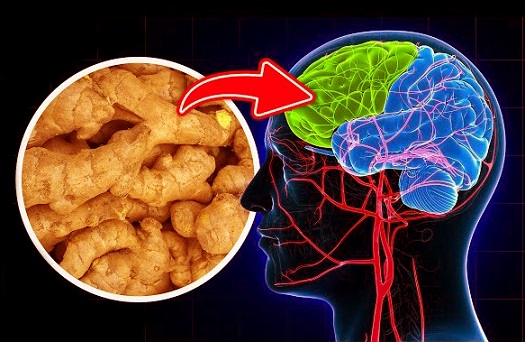Thailand Medical Study Involving Ginger Phytochemicals Could Transform Neurodegenerative Disease Treatments
Nikhil Prasad Fact checked by:Thailand Medical News Team Dec 23, 2024 1 year, 1 month, 1 week, 5 days, 6 hours ago
Thailand Medical: Neurodegenerative diseases like Alzheimer’s, Parkinson’s, and Huntington’s disease present critical global health challenges, characterized by the gradual death of neurons and a decline in brain function. These diseases stem from complex mechanisms, including oxidative stress, inflammation, and apoptosis - processes that ultimately lead to the irreversible loss of neuronal cells.
 Thailand Medical Study Involving Ginger Phytochemicals Could Transform Neurodegenerative
Thailand Medical Study Involving Ginger Phytochemicals Could Transform Neurodegenerative
Disease Treatments
Current therapies aim to manage symptoms rather than addressing the root causes, prompting researchers worldwide to explore alternative treatments. One such breakthrough, detailed in a recent study, involves bioactive compounds derived from Zingiber officinale Roscoe, commonly known as ginger. This news report discusses how
Thailand Medical researchers have made strides in enhancing the potential of these compounds using cutting-edge encapsulation technology.
Research Conducted by Thai Institutions
This groundbreaking study was conducted by researchers from Mahasarakham University’s Biomedical Research Unit and the School of Biotechnology at Suranaree University of Technology. The research focuses on two key ginger-derived phytochemical compounds: 6-gingerol and 6-shogaol. These compounds, known for their potent antioxidant and anti-inflammatory properties, hold promise for preventing neuronal damage associated with oxidative stress and inflammation. The study employed a unique phytosome encapsulation technology to improve their bioavailability, a critical factor limiting the effectiveness of natural compounds.
Encapsulation Technology for Enhanced Potency
Phytosome encapsulation involves binding bioactive compounds to phospholipids, creating a structure that mimics the lipid bilayers of cell membranes. This enhances the compounds’ stability, solubility, and absorption in the human body. Researchers noted that encapsulating 6-gingerol and 6-shogaol in phytosomes significantly improved their ability to reach targeted cells in the brain. This technology also facilitated sustained therapeutic effects, amplifying the compounds’ neuroprotective actions.
In laboratory tests, the phytosome-encapsulated extracts demonstrated superior antioxidant and anti-inflammatory activity compared to their unencapsulated counterparts. These improvements were particularly evident in assays measuring the compounds’ ability to scavenge reactive oxygen species (ROS), inhibit lipid peroxidation, and suppress inflammation.
Study Design and Key Findings
The study utilized SH-SY5Y human neuroblastoma cells, a model widely used to study neuronal damage. Oxidative stress was induced using hydrogen peroxide (H2O2), a compound known to trigger neuronal apoptosis and inflammation. The cells were pretreated with the phytosome-encapsulated ginger compounds (6GS) at two concentrations: 15.625 μg/mL and 31.25 μg/mL.<
;br />
Key findings revealed that 6GS:
-Enhanced Antioxidant Enzyme Activity: Levels of critical enzymes like catalase (CAT), superoxide dismutase (SOD), and glutathione peroxidase (GSH-Px) were significantly elevated, mitigating oxidative stress in treated cells.
-Reduced Lipid Peroxidation and ROS Levels: Malondialdehyde (MDA), a marker of lipid damage, and ROS levels were markedly reduced, highlighting the compounds’ efficacy in protecting cellular membranes and preventing oxidative damage.
-Regulated Apoptotic and Inflammatory Markers: The expression of Bcl-2, an anti-apoptotic protein, increased, while caspase-3, a protein involved in cell death, was suppressed. Similarly, levels of tumor necrosis factor-alpha (TNF-α), a key inflammatory cytokine, were significantly lowered.
-Activated Neuroprotective Pathways: The compounds activated the phosphoinositide 3-kinase (PI3K)/protein kinase B (Akt) pathway, promoting neuronal survival by reducing apoptosis and inflammation.
Mechanisms Underlying Neuroprotection
The study’s findings emphasize the critical role of the PI3K/Akt pathway in the neuroprotective effects of 6GS. This pathway facilitates the phosphorylation of Akt, which in turn regulates proteins involved in cell survival and apoptosis. The increased expression of Bcl-2 and the suppression of caspase-3 highlight the compounds’ ability to prevent programmed cell death.
Additionally, the compounds’ potent antioxidant effects were evident in their ability to neutralize ROS and enhance the activity of endogenous antioxidant enzymes. By reducing oxidative stress, the compounds minimized the damage to cellular structures and maintained neuronal integrity. The suppression of inflammatory markers like TNF-α further underscored their potential to combat neuroinflammation, a hallmark of neurodegenerative diseases.
Broader Implications for Neurodegenerative Diseases
The implications of these findings extend beyond the laboratory. By addressing key factors underlying neurodegeneration, 6GS offers a multifaceted approach to disease management. Its ability to reduce oxidative stress, modulate inflammation, and regulate apoptotic pathways positions it as a promising candidate for future clinical applications.
Moreover, the enhanced bioavailability achieved through phytosome encapsulation overcomes a significant barrier in the therapeutic use of natural compounds. This advancement could pave the way for the development of functional foods, dietary supplements, or pharmaceuticals targeting neurodegenerative diseases.
Study Limitations and Future Directions
While the in vitro results are promising, further research is needed to translate these findings into clinical settings. Animal studies and human trials will be essential to evaluate the safety, efficacy, and optimal dosing of 6GS. Additionally, understanding the long-term effects of these compounds will be critical for their integration into therapeutic regimens.
The researchers also emphasized the need to explore the potential synergistic effects of 6GS with existing treatments. Combining these compounds with other neuroprotective agents could enhance their therapeutic outcomes and provide a comprehensive approach to neurodegeneration.
Conclusion
The study conducted by
Thailand Medical researchers offers compelling evidence that phytosome-encapsulated 6-gingerol and 6-shogaol hold significant promise as neuroprotective agents. By addressing critical mechanisms of oxidative stress, inflammation, and apoptosis, these compounds could revolutionize the treatment of neurodegenerative diseases.
Their enhanced bioavailability and efficacy, achieved through advanced encapsulation technology, mark a significant step forward in leveraging natural compounds for therapeutic purposes. As research progresses, 6GS could become a cornerstone in the fight against neurological disorders, offering hope to millions worldwide.
The study findings were published in the peer-reviewed journal: Molecules.
https://www.mdpi.com/1420-3049/29/24/6046
For the latest Medical Research News, keep on logging to
Thailand Medical News.
Read Also:
https://www.thailandmedical.news/news/thailand-medical-researchers-explore-the-use-of-kratom-to-treat-alzheimer-s-disease
https://www.thailandmedical.news/news/thailand-medical-researchers-find-that-huperzine-a-from-huperzia-serrata-moss-can-help-combat-alzheimer-s-disease
https://www.thailandmedical.news/articles/thailand-medical
